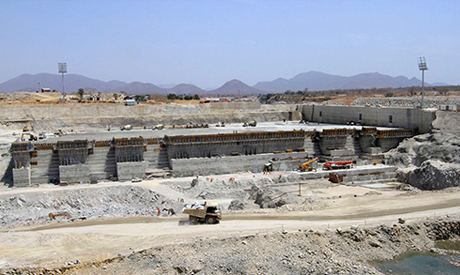Date: Sun, 4 Oct 2015 20:38:09 +0200
Future of negotiations remains unclear as Ethiopia asks to postpone the tripartite meeting of 4 October

A tripartite meeting that was supposed to be held in Egypt on Sunday has been postponed upon the request of Addis Ababa in the latest setback to efforts to reach a compromise over Ethiopia's Renaissance Dam.
Egypt had invited Ethiopian and Sudanese officials, along with representatives from the consultancy firm studying the impact of the dam, to a meeting headed by the Egyptian National Committee of the Grand Ethiopian Dam (TNC).
The meeting was arranged to discuss the recent differences between the countries over the building of the Renaissance Dam in Ethiopia.
The tripartite meeting was scheduled to take place in Egypt on Sunday 4 October, a date that was confirmed during President Abdel-Fattah El-Sisi's meeting with Ethiopian Prime Minister Hailemariam Desalegn during the UN General Assembly meeting.
The two leaders met on the sidelines of the General Assembly in New York last week and confirmed that negotiations over the controversial dam would continue on 4 October.
This is not the first setback since the three countries signed the declaration of principles in March, which aims to safeguard the interests of all parties involved.
In September, Egypt expressed its concern after the two foreign consultancy firms failed to deliver their reports to the tripartite committee on time.
They had also missed a deadline in August, forcing the tripartite committee to re-schedule for 5 September.
The Dutch consultancy firm, Deltares, then withdrew from the assessment of the dam in September. The firm reasoned that the conditions set by the TNC did not provide Deltares with the opportunity to carry out an independent, high quality study.
The continuous stalling by Ethiopian officials and the withdrawal of the Dutch firm has put future negotiations in jeopardy.
Ex-irrigation minister Mohamed Nasr Allam has called on the Egyptian government to appeal to the United Nations to resolve the matter due to the failure of negotiations with Ethiopia.
Egypt, with its share of 55 billion cubic meters, is currently suffering from a water deficit of 20 billion cubic meters which it compensates through water recycling, a process that is not viable in the long run.
The dam, scheduled to be completed in 2017, will be Africa's largest hydroelectric power plant with a storage capacity of 74 billion cubic meters of water.